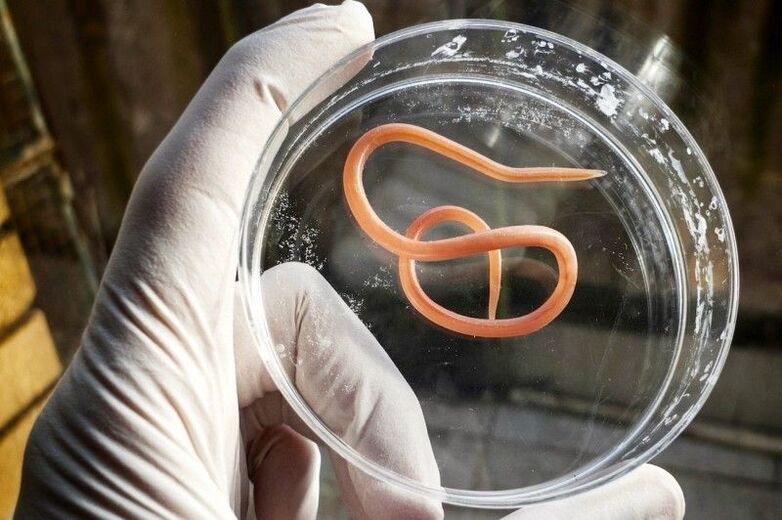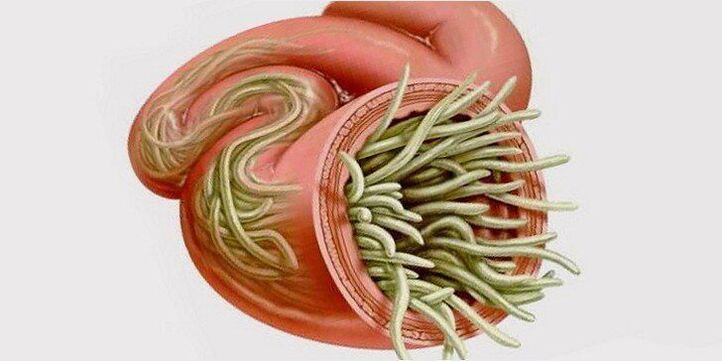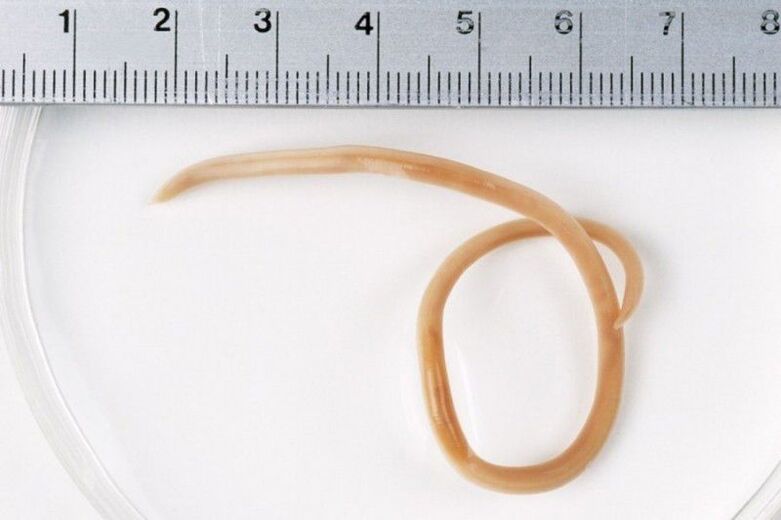
what is worm
During their development, worms traditionally pass through several stages: egg - larva - adult. Most worm infections occur when worm eggs are ingested.

As we said above, adult worms traditionally have stable positioning within the body, their developmental forms often migrate to different organs and tissues, and their movement paths are often quite complex. For example, with ascariasis, a person becomes infected by eating food contaminated with roundworm eggs (the roundworm eggs mature underground).


How did worms (parasites) appear?
- The acute stage of parasitic development begins from the moment the patient is infected with worms and lasts 2-3 weeks (in cases of severe disease - up to 2 months).This stage is characterized by the predominance of allergic manifestations (rash, dry cough, increased levels of eosinophils in the blood), which are a reaction to the appearance of migrating larval antigens (fragments) in the blood. When early forms of the parasite (larvae) are present in an infected person, the immune response is evident;
- The acquired developmental phase of helminths occurs after the acute phase and lasts for weeks, months, or years (up to 10 years for some helminth diseases). For us, symptoms at this stage depend on the location, number and feeding habits of the worms.
Where they spread, parasites destroy tissue with their anchoring organs (hooks, spines, cutting boards, horny spines). Injury causes tissue irritation and the development of an inflammatory response.

With other helminthiasis, such as pinworms, nocturnal itching in the anal area may occur; intense attack of whipworms can lead to the development of hemorrhagic colitis; in children, symptoms of rectal prolapse may occur.
- Lack of hygiene skills – dirty hands, working on the ground;
- Consumption of food contaminated with parasites - unwashed fruits and food eaten by the husband, as well as meat and fish without adequate heat treatment (kebabs, raw steaks, smoked foods, sushi, etc. );
- Drinking unboiled water contaminated with insect eggs;
- Contact with natural host animals for worms - cats and dogs, wild animals (hunting, fishing, working on fur farms);
- Contact with someone with helminthiasis - shaking hands, walking through bed sheets, doorknobs, etc.
What organs can worms live in?
- empty– Worms that live in various parts of the gastrointestinal tract. There are approximately 100 species of intestinal parasites, with dozens found in every part of the intestines. The small intestine is primed to receive roundworms, slugs, tapeworms, and other less common "brothers. "The small intestine will "share living space" with pinworms, dwarf tapeworms, etc. The medical literature describes cases in which a person was infected with multiple parasites at the same time;
- fabric- Worms are found in organs, tissues and even blood. Modern medicine successfully treats paragonimiasis (lungs), cysticercosis (brain), hydatidosis (liver) and filariasis (lymphatic vessels). Some worm larvae move throughout the body through the circulatory system and attach themselves to any organ at random. If large numbers of eggs are introduced, the entire body can become infected.
How do you get infected with worms?
- Through soil and water - Geoworms. They develop in sand, soil and water, then enter the human body and begin laying eggs. Next, the eggs enter the external environment along with the excrement, waiting for the opportunity to infect new people. Eating unwashed vegetables and fruits, dirty hands, and food dust can all lead to soil worm infection. Some parasite eggs enter the body through the skin of the feet and ankles;
- through direct contact.Worms in domestic animals and humans are spread through hand contact, play, and joint activities.
- By eating contaminated food of animal origin - biological helminthiasis. Eating raw and lightly processed meat (kebabs, lard, cured meats, homemade game) and fish (sushi, dried fish, pickled fish) is potentially dangerous. Possibility of contracting intestinal infections and biological worms;
- for insect bites. This type of infection is very rare. These include intestinal myiasis, cantasia, and ascariasis. Not to be confused with the eggs of parasites and insect larvae, which are also deposited under the skin of animals and people (e. g. gadfly larvae).
Symptoms of worms
- luminescent.Coeloid worms inhabit areas of the small and large intestines. For example, the area that roundworms and tapeworms inhabit is the small intestine. Pinworms live in the lower part of the small intestine, and whipworms live in the large intestine;
- Muscle (cell).They live in muscle cells, lung tissue, brain cells, liver, lymph nodes and eyes. Some worms are luminal and cellular because in their early stages they migrate with the blood circulation and reside in the organs mentioned above.
Symptoms of human worms, first signs
- Lack of appetite or, conversely, overeating, bitter mouth and excessive salivation;
- Strong cravings for sweets (worms feed on carbohydrates);
- Nausea, vomiting—sometimes worms crawl into the stomach, or their parts (segments) are found in vomit;
- Anal itching and teeth grinding during sleep often indicate pinworm disease;
- Unstable stool - often causes intestinal flora imbalance and helminth disease, accompanied by frequent changes in diarrhea and constipation; when the infection is severe, worms can be excreted in the feces;
- Flatulence - Bloating and rumbling in the stomach caused by toxins produced by worms;
- Periodic abdominal pain - diffuse, usually localized to the navel area, sometimes spasmodic;
- Cutaneous manifestations - sudden allergic rashes and suppurative formations (acne, boils) due to a decrease in local immunity and elimination of toxins through the skin, often in a severe form, together with weakness of the nails and excessive hair loss;
- Irritable Bowel Syndrome - Impaired nutrient absorption leading to anemia and weight loss, especially with large helminth colonies;
- Cough is a dry symptom of the pulmonary stage of helminthiasis (roundworm larvae enter the lungs with the blood); severe infection can lead to pneumonia;
- Obesity - Oddly enough, intestinal parasites can also cause obesity. When intestinal parasites feed on carbohydrates, it can cause a sharp drop in blood sugar, forcing people to eat more food while the body stores fat as reserves;
- Neurological symptoms - irritability, poor sleep quality or lethargy, persistent depression, decreased concentration, and memory problems are particularly noticeable in children with helminthiasis;
- Chronic Fatigue Syndrome - Parasites often cause persistent weakness, prolonged temperature rise to 37-37. 5°C, flu-like symptoms and muscle aches;
- Pathology of the upper respiratory tract - slow runny nose, untreatable cough, even pneumonia and asthma are often caused by the presence of worms;
- Decreased immunity - accompanied by helminthiasis, intestinal flora dysbiosis and chronic poisoning, leading to frequent colds and pathologies that are indicators of immune deficiency (herpes, warts, etc. ), including tumor pathology.
Flat parasites in humans. symptom
fluke

Schistosoma
model

Echinococcus
tapeworm

bull tapeworm
pork tapeworm

Dwarf tapeworm
Roundworms in humans. symptom
roundworms
Pinworm
Trichinella spiralis

hookworm
Is it worth taking anti-helminth pills for prevention?
- Pets present;
- constant contact with the ground (playing with sand, villagers);
- Whether the child lives permanently in a closed group of children;
- Travel regularly to exotic countries;
- Hobbies: fishing, hunting, beach volleyball, football.



























